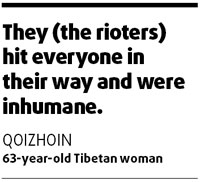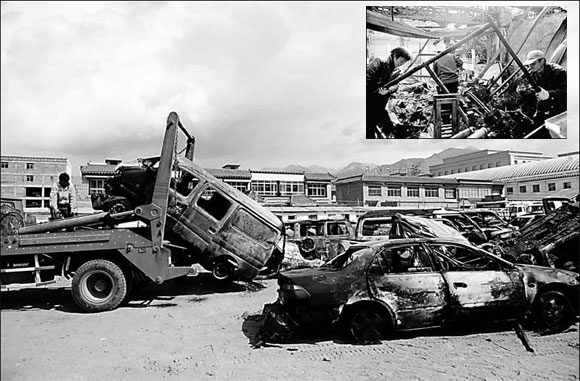City starts on road to recovery
By Ren Ke and Wu Qi (Xinhua/China Daily)
Updated: 2008-03-21 07:21
Updated: 2008-03-21 07:21
|
|
Peng Zhongyang now lives in the conference room of the city's urban construction bureau. The 37-year-old lost his home and brother-in-law to the riot that broke out on Friday in Lhasa - which means the "Place of the Gods".
The father of two is still haunted by the violence that broke out in the city. Around 3:30 pm last Friday, after he picked up his son and daughter at school, he was caught up in the chaos.
"We encountered more than 10 mobs throwing stones on the street," Peng said.
The owner of two clothing stores ran for his life, with his children. But the mob chased them to his store on Duosenge Road.
"Roughly 30 of the rioters tried to break in," he said, recalling that a Tibetan girl was shouting to him for help.
Peng took her into the store, where eight people sought sanctuary and tried to keep the mob out by putting a bed against the door.
"After chopping down the door (with their swords), they threw in gas-filled mineral water bottles and set the place on fire," Peng said.
At 5:30 pm, when the firemen and police arrived, the rioters scattered, but the fire spread to Peng's store next door, in which his brother-in-law Zuo Rencun was hiding. Peng found his dead body there later.

Zuo was among the 13 civilians burned or stabbed to death that day, with many others injured.
Peng also suffered business losses of around 500,000 yuan ($71,000). That is "two to three years of income", he said.
Anger and fear is still hanging over Lhasa 10 days after the riot took place.
"They (the rioters) hit everyone in their way and were inhumane," said Qoizhoin, a 63-year-old Tibetan woman who was hospitalized after being injured on the way home.
Lorci, a Tibetan doctor at the local People's Hospital, said he treated a 1-year-old child affected by the heavy smoke from fires set by the mobs.
When he was returning to the hospital in an ambulance, it was stopped by a roadblock set up by the mob. When he tried to remove the obstruction, he was pelted with stones.
The "3/14 incident" originated at Ramoche Monastery, where a group of monks stoned policemen around 11 am. Later, rioters went to Barkhor bazaar, a bustling tourist spot, where they burned down houses and shops. The chaos then extended to other parts of the city.
Doje Cering, a 25-year-old villager, was among the 170 people who surrendered to police on Wednesday, after Tibetan law enforcement authorities called on the rioters to halt and offered leniency to those who turned themselves in.
He admitted stoning a red sedan and a white van. He said he was at home, drunk, when he heard someone shouting: "Get out, or we will burn down your house." Then he followed the crowd.
The riot on Friday was preceded by events that started on March 10, when more than 300 monks from Drepung Monastery made their way to downtown Lhasa and confronted security forces.
It was the anniversary of an earlier event, on March 10, 1959, when there was a failed rebellion by Tibetan secessionists.
The rioting has aroused strong condemnation, but even so, there is hope.
"It will not undermine the harmony between Tibetans and Hans cultivated over thousands of years' history," said Tibetologist Kelsang Yeshe, president of the Tibetan Ancient Book Publishing House.
The central government has poured billions of yuan into Tibet to help its economic and social development. In 2006, Tibet's GDP hit 29 billion yuan, more than 45 times that of 1959.
Meanwhile, civil servants and local residents took to the streets on Sunday to clean up in the worst hit areas.
"They stirred up a decent city and turned it into chaos. They were truly horrible," said Yangjain, a local Tibetan.
The main streets in the downtown area, which were scattered with rubbish and rocks, were again crowded with traffic on Sunday.
As for clothing store owner Peng Zhongyang, he said the local elementary school has given children free schoolbags and books.
"I appreciate the concern of local people," he said.
Li Zhihui and Yan Yuanyuan from Xinhua contributed to the story / China Features
|
||
|
||
|
|
|
|
